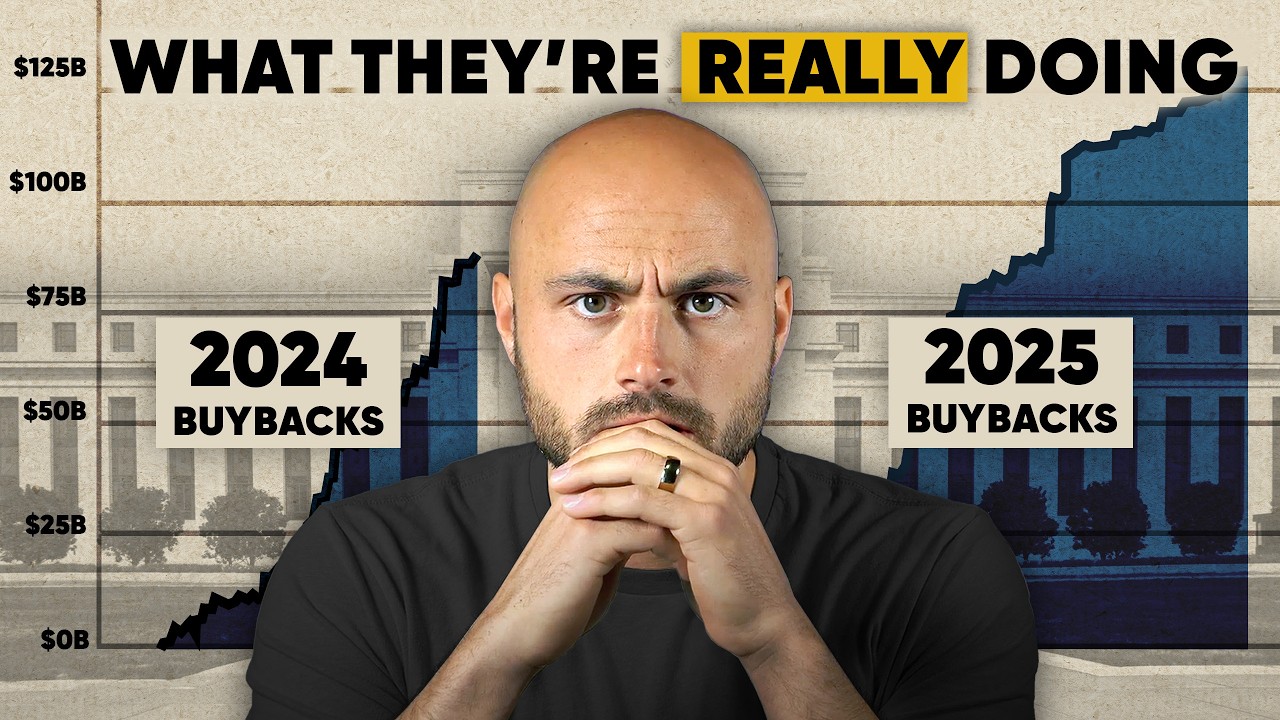Video
The Real Reason The Treasury is Buying Back So Much Debt

Get my FREE newsletter Letters From a Heretic: https://go.heresy.financial/letters-from-a-heretic
TIMECODES
00:00 Treasury Buybacks Explained
00:28 Fed vs Treasury – Key Differences
01:22 How the Treasury Manages Money
02:20 Treasury Bonds, Notes, and Bills
03:40 America’s Growing Deficit
04:17 How Treasury Auctions Work
05:01 Buying and Selling Treasuries
06:07 Why the Government Is Buying Back Debt
07:06 The Credit Card vs Mortgage Analogy
08:11 Why Short-Term Debt Is Replacing Long-Term Debt
09:50 What’s Really Driving Buybacks
11:00 Why the Numbers Don’t Add Up
11:37 Fed Rate Cuts and Short-Term Debt Strategy
13:43 Liquidity Problems in the Treasury Market
15:31 The Real Reason Behind Treasury Buybacks
16:22 Can This Game Keep Going?
My Important Links:
Get my FREE newsletter Letters From a Heretic: https://go.heresy.financial/letters-from-a-heretic
Get my Hedged Hyper Growth Portfolio Blueprint for its lowest price ever: https://go.heresy.financial/hypergrowth
Affiliate Partners:
Monetary Metals (earn yield on gold) https://monetary-metals.com/heresy-financial/
Miles Franklin (buy gold, best price) https://milesfranklin.com/heresy-financial/
Swan Bitcoin (stack bitcoin) http://bit.ly/swnhrsy
M1 Finance (invest in stocks) https://m1.finance/MNoCZwlvGStC
Socials @HeresyFinancial
Twitter: https://www.twitter.com/heresyfinancial
Insta: https://www.instagram.com/heresyfinancial
TikTok: https://www.tiktok.com/@heresyfinancial
Reddit: https://www.reddit.com/user/heresyfinancial/
Rumble: https://rumble.com/c/HeresyFinancial
My name is Joe Brown, and I’m a former stock broker who spent years advising the top 1% on how to manage their wealth. After making enough money to leave the corporate world behind, I turned my attention to teaching regular people financial strategies that exist outside the mainstream – things you’ll never hear from your traditional fiancial advisor.
I am not a CPA, attorney, or licensed financial advisor and the information in these videos shall not be construed as tax, legal, or financial advice from a qualified perspective. Linked items may create a financial benefit for Heresy Financial.
source
Video
XRP Could Become Worthless, Here’s Why

Will XRP be replaced by Stablecoins like USDT, USDC, and more? The truth might shock you…
➡ Follow me on X for time sensitive calls: https://x.com/elliotrades
➡ Follow my IG (you’re early): https://www.instagram.com/elliotrades/
Timestamps:
0:00 XRP vs Stablecoins
4:02 The Dream of 2017
7:40 XRP’s Major Problems
10:04 The Rise of Stablecoins
15:10 XRP’s Thesis: Then vs Now
20:34 XRP’s Recent Wins
26:24 Will Stablecoins Kill XRP?
DISCLAIMER: This is not financial advice! This is an entertainment and opinion-based show. I am not a financial adviser. Please only invest what you can afford to lose, and we encourage you to do your own research before investing. DYOR
source
Video
Complete Financial Accounting Course – 11-Hour Full Tutorial for Beginners

📘 Download the Workbook: http://www.tonybell.com
🎓 Unlock 100+ Members Accounting Tutorials: https://www.youtube.com/channel/UCNFClg6mzfZ5ixpuH9c7f1A/join
📚 Welcome to the Complete Financial Accounting Course
This 11-hour tutorial covers the entire financial accounting curriculum — from the basics of journal entries to the preparation and analysis of financial statements.
You’ll learn step-by-step through structured lessons, including:
00:00 – Module 1: Introduction to the Financial Statements
1:17:10 – Module 2: Recording Transactions
2:49:15 – Module 3: Adjusting Entries and Closing Entries
4:24:24 – Module 4: Cash
5:00:40 – Module 5: Receivables
5:37:30 – Module 6: Inventory Purchases, Sales, Returns and Discounts
6:20:23 – Module 7: Cost of Inventory (FIFO, LIFO, Weighted Average)
7:06:33 – Module 8: Property, Plant and Equipment
7:47:28 – Module 9: Liabilities and Bonds
8:54:10 – Module 10: Equity
9:14:33 – Module 11: Statement of Cash Flows
10:07:13 – Module 12: Ratios and Financial Statement Analysis
🎓 Includes: Dozens of practice problems, walkthroughs, and comprehensive examples
Perfect for beginners, accounting students, and anyone preparing for exams.
source
Video
BlackRock’s $16 Trillion XRP Shift Happening Now

BlackRock isn’t just watching XRP—they’re building the future of global finance on top of it. While the retail market is distracted by $2 price candles, the world’s largest asset manager is moving into the “Phase 2” of the Great Tokenization. In this investigative documentary, we go behind the headlines to uncover the real reason BlackRock is eyeing the XRP Ledger: a $16 trillion shift in real-world assets (RWA) that legacy banking isn’t ready for.
From the secret integration of Ripple’s RLUSD into the BUIDL fund to the massive software update hitting 300 million bank accounts via the Hogan platform, the infrastructure for a new financial system is being laid in real-time.
In this video, we break down: 🚀 BlackRock’s BUIDL Fund & the RLUSD Collateral Play 📈 Why XRP Exchange Reserves just plummeted by 50% 🏦 The DXC/Hogan Partnership: How 300M bank accounts just got “XRP Ready” ⚠️ The Counter-Argument: Is “Institutional DeFi” just a walled garden? 🎯 The $14 Target: Analyzing the 2026 Supply Squeeze math.
—————————————————————–
📚 Learn:
👉 https://cheekyschool.com/
👉 Grab 50% OFF with this Code: YT50OFF
Educational resource only – no guarantees of financial outcome.
🔗 Free Educational 𝗗𝗶𝘀𝗰𝗼𝗿𝗱:
👉 https://discord.gg/cheekycrypto
🧠 This is a community for educational discussion only.
🚫 No financial advice is provided.
👨💼 Admins and moderators are not licensed financial professionals.
📱 Learn More About UNITY
👉 https://unitynodes.io/
🔗 Kraken XRP DEAL
👉 Special Link: https://kraken.pxf.io/c/6189776/3300403/10583
👉 Full T&Cs: https://www.kraken.com/en-de/legal/affiliate-incentive-25-xrp-terms
—————————————————————–
🎥 OUR YOUTUBE CHANNELS
🔹 Follow Cheeky Crypto 𝗼𝗻 YouTube: / @CheekyCrypto
🔹 Follow Cheeky Crypto Trading 𝗼𝗻 YouTube: / @CheekyCryptoPlus
🔹 Follow Cheeky Crypto News 𝗼𝗻 YouTube: / @CheekyCryptoNews
🔹 Follow Cheeky Crypto Education 𝗼𝗻 YouTube: / @CheekyCryptoEducation
🔹 Follow Cheeky Crypto Unfiltered 𝗼𝗻 YouTube: / @Cheeky_Crypto_Unfiltered
—————————————————————–
📱 FOLLOW US ON SOCIAL MEDIA
🐦 Follow us 𝗼𝗻 𝗫: / cheekycrypto
📘 Follow us 𝗼𝗻 𝐅𝐚𝐜𝐞𝐛𝐨𝐨𝐤: / cheekycrypto
—————————————————————–
Check out our Affiliate Offers:
We may earn a commission if you sign up through the link below.
👉 https://portal.cheekycrypto.io/cheeky-crypto-affiliate-links/
—————————————————————–
⚠️ 𝗕𝗘𝗪𝗔𝗥𝗘 𝗢𝗙 𝗦𝗖𝗔𝗠𝗠𝗘𝗥𝗦 𝗜𝗡 𝗢𝗨𝗥 𝗖𝗢𝗠𝗠𝗘𝗡𝗧𝗦 𝗔𝗡𝗗 𝗖𝗢𝗠𝗠𝗨𝗡𝗜𝗧𝗬 𝗖𝗛𝗔𝗡𝗡𝗘𝗟𝗦 ⚠️
🛑 DISCLAIMER:
This is a channel for entertainment purposes only. All opinions expressed by the hosts and guests should not be construed as financial advice.The views of guests and hosts do not necessarily reflect those of the channel.
We do not promote any get-rich-quick schemes, trading strategies that guarantee returns, or risky financial behavior.
All trading decisions are your own responsibility. Viewers are strongly encouraged to do their own research.
Trading cryptocurrencies carries a significant risk of loss, and no outcome is guaranteed. This Channel does not offer financial services or securities and does not guarantee any results.
Affiliate offers are intended only for non-UK residents.
This content complies with YouTube’s Harmful and Dangerous Content policies and is intended for mature audiences interested in learning about blockchain technology. Some links are affiliate offers.
We may earn a commission if you sign up through them, at no additional cost to you.
These platforms are not recommendations and are shared for informational purposes only.
Offers vary and may not be available in all regions. Please consult your local laws and financial advisor before participating.
—————————————————————–
Timestamps
source
Video
Frezza, Dipinto – MONEY DRIBBLING (Visual Video)

Frezza, Dipinto – MONEY DRIBBLING (Visual Video)
Ascolta l’album “SCUGNIZZI X SEMPRE”: https://wmi.lnk.to/scugnizzixsempre
Segui Frezza:
Instagram | https://www.instagram.com/frezzab4w
TikTok | https://www.tiktok.com/@frezza_1
Spotify | https://open.spotify.com/artist/32G8poKFhw5C0um4jMXH9W
Segui Dipinto:
Instagram | https://www.instagram.com/_dipinto____/
TikTok | https://www.tiktok.com/@_dipinto__
Spotify | https://open.spotify.com/artist/26toJml6wSdf58ZgNG0ci9
Prod. Fresh Beatz
Creative Director & Motion Designer by Ciro (serseuniverse) Di Bello
#Frezza #Dipinto #SCUGNIZZIXSEMPRE
source
Video
How I became a Millionaire before 30!

Attend our Masterclasses: https://bit.ly/4mJ4ycI
Join the 1% Club: https://bit.ly/4mymUgm
—
Subscribe:
The 1% Club:
YouTube : https://www.youtube.com/@UCBI57iTXtmJoaI6Ht7MgcfA
Instagram: https://www.instagram.com/onepercentclub/
Linkedin: https://www.linkedin.com/school/the-1-clubfws
Sharan Hegde:
Instagram: https://www.instagram.com/financewithsharan/
LinkedIn: https://www.linkedin.com/in/sharanhegde95/
Twitter: https://x.com/financewsharan
—–
🎙️ In this episode of Finance With Sharan, we dive into an inspiring journey of resilience, ambition, and transformation.
From childhood struggles to building a career, chasing dreams, and learning from failures — Sharan walks us through the defining chapters of his life.
💡 It’s not just a story, but a playbook for anyone navigating challenges, seeking purpose, or pushing through obstacles.
This video is for educational purposes only.
⏳ Chapters in this Episode
0:00 – Intro
1:08 – Starting & working in a 9–5
2:48 – Starting my side hustle
7:17 – ₹2,000/month → ₹20 lakh/month
10:16 – The Birth of the 1% Club
15:04 – From Millionaire to Billionaire
18:28 – How you can reach there
🔥 Why Watch This Episode?
Real, unfiltered conversations — not the highlight reel.
Life lessons you won’t find in textbooks.
A reminder that success is built one chapter at a time.
👉 Don’t forget to Like, Comment, and Subscribe for more powerful conversations.
Sharan Hegde is a personal finance expert featured in Forbes, Economic Times, Mint, Times of India, and more. As the Founder of 1% Club, India’s largest finance community, he’s dedicated to helping people achieve financial independence.
#RealEstate #LuxuryVillas #BusinessStrategy #StayVista #1PercentClub #Podcast #LifeLessons #Journey
Connect with me:
Instagram: https://www.instagram.com/financewithsharan/
Facebook: https://www.facebook.com/financewithsharan
LinkedIn: https://www.linkedin.com/in/sharanhegde95/
Twitter: https://twitter.com/financewsharan
#financewithsharan #finance #sharan
source
Video
DIVORCED PARENTS GET LESS FINANCIAL AID!!!

DIVORCED PARENTS GET LESS FINANCIAL AID!!! If your parents got divorced, you will often run into an unfortunate situation when you are applying for a financial aid, because especially if they remarried, they will have formed two households – and colleges take that into account.
When Ivy League colleges, tell you that they offer need based financial aid what it means is that they are going to look at your family’s total income and assets, including home value, and retirement accounts, and then determine what the maximum that you could reasonably pay is, and then make you pay it.
The problem is, if your parents got divorced, and especially if they remarried, you likely have two households worth of assets and income that now have to be factored in to the financial aid equation. Some colleges have gotten sophisticated to be able to offset this, but most have not. And so often the children of divorce divorced parents will end up getting much lower financial aid packages than they would have gotten. Had the parents been together.
Given that close to 50% of marriages in 🇺🇸 and a divorce, you would think that the colleges would’ve come up with a better solution than the current system, but the status quo pays them more money so I can see why they would rather keep it as it is.
Keep this in mind when you are applying for financial aid at Ivy League colleges, and make sure you apply to outside scholarships so that you can afford to attend.
source
Video
Retro Xitlar – SHAXRIYOR | KEL MONEY

Официальный сайт: http://www.zortv.uz
ZO’RTV @ Instagram http://instagram.com/ZORTV.UZ
ZO’RTV @ Telegram https://telegram.me/ZORTV_KANAL
source
Video
PSX | Mari Energy | KSE 100 Index New High | Automobile Sector To Perform | GAL | GHNI | SAZEW

Welcome to Financial Talks – Your Guide to Smart Money in Pakistan!
At Financial Talks, we simplify finance for everyone. Whether you’re a student, a working professional, or an aspiring investor, this channel is your go-to hub for:
💰 Finance Tips
📊 Investing in PSX & Mutual Funds
📉 Saving Hacks
📈 Financial Planning & Wealth Building
📚 Financial Education in Urdu & English
💰 Money Growth
💼 Buisness Ideas
🎙️ Financial Podcasts
Our Other Social Media Accounts:
1) Instagram:
brownz_eyez
2) Facebook:
qazi abd
3) Join WhatsApp Discussion group:
a) https://chat.whatsapp.com/DHrvz9At1s6…
b) https://chat.whatsapp.com/I5mdo5h9Eu0…
4) WhatsApp channel:
https://whatsapp.com/channel/0029VaDJ.
5) Our Second Channel Link:
https://youtube.com/@qazispeaks?si=rlry9Wbqvi9-wt37
6) PSX Basic Course Link:
Our mission is to empower Pakistanis with financial knowledge to help you make smarter money decisions, grow your income, and secure your future.
Our Whatsapp Discussion Group: https://chat.whatsapp.com/I5mdo5h9Eu05FpfnXIdxcX?mode=wwt
Subscribe and join us on the journey to financial freedom.
#psx
#financialtalks
#financialeducation
#qazispeaks
source
Video
XRP Capitulation Ending!

Welcome to Zach Rector’s channel!
iTrust Capital- https://www.itrustcapital.com/go/zach-rector
Legal & Estate Planning- https://calendly.com/new-client-specialists/15-minute-interview-affiliate?a1=Rector&month=2025-12
Are you ready to take advantage of the greatest transfer of wealth in world history?
Join our community at http://www.ZachRector.com and discover how you can not only survive, but thrive in this exciting time.
XRP Family MERCH- https://zachrector.com/shop/
Patreon/Discord Private Community- https://www.patreon.com/zachrector
Buy XRP & Trade Crypto-
Caleb & Brown- https://www.calebandbrown.com/affiliates/zach-rector/
Uphold- https://wallet.uphold.com/signup?referral=7ae0597d45
Coinbase- https://coinbase.com/join/PJCHZE2?src=ios-link
Coinbase Advanced Trading- https://advanced.coinbase.com/join/XXTYJ2Z
First Ledger- https://firstledger.net/?ref=DO9SdgMahaeK
Send XRP Tips & NFTs- r41a9RBNQYVx1XowGUUNEbJxKdKnMpHQEo
Precious Metals- https://zachrector.com/gold-and-silver/
Book 1 on 1 Call with Zach- https://calendly.com/zachrector/30min?month=2024-09
Crypto Wallets-
Ellipal- https://www.ellipal.com/?rfsn=6318619.6c7e7c
DCent Wallet- https://store.dcentwallet.com/products/biometric-wallet-affiliates?bg_ref=qBGObYeQ71
Trezor- https://trezor.io/trezor-model-t?transaction_id=102790791fb667a080e84dbbf37fc1&offer_id=134&affiliate_id=10442
Follow us on social media for the latest updates on:
Twitter (https://www.twitter.com/ZachRector7),
Rumble (https://www.rumble.com/user/zachrector7),
YouTube (https://www.youtube.com/user/Rector94),
TikTok (https://www.tiktok.com/@ZachRector7).
Thank you for joining us on this journey to financial freedom!
#xrp #ripple #xlm #stellar #xdc #buyback
#CryptocurrencyExchange #CryptocurrencyWallet #CryptocurrencyMarketNews #AltcoinInvesting #BlockchainTechnology #CryptocurrencyRegulations #HODL
#trading #investing #altcoins #crypto #blockchain #cryptocurrency #bitcoin
source
Video
Short Sellers – The Anti-heroes of Financial Market

In this mini-documentary, we learn how short selling was first invented and study all the skillful ways that short-sellers like Soros and Einhorn used to generate returns.
We fund traders with $100K+ and pay out 80% profit share.
Apply now ➡️ fcm.finaius.com
🎯 Use code Finaius to get 10% off signup fees.
Instagram: falcon.xu
LinkedIn: linkedin.com/in/rocky-xu-0487498b/
Music – https://open.spotify.com/artist/5dzPVAUf41IpdTu7JKP79X?si=1OH2KwSaRnWQZVurawxXTw
02:40 – The First Short Selling in History
06:01 – The First Hedge Fund
07:25 – George Soros
10:58 – Jim Chanos
13:56 – David Einhorn
16:01 – Melvin Capital and GameStop
#GME #ShortSelling
source
-

 Video4 days ago
Video4 days agoWhen Money Enters #motivation #mindset #selfimprovement
-

 Tech3 days ago
Tech3 days agoWikipedia volunteers spent years cataloging AI tells. Now there’s a plugin to avoid them.
-

 Politics5 days ago
Politics5 days agoSky News Presenter Criticises Lord Mandelson As Greedy And Duplicitous
-

 Sports7 days ago
Sports7 days agoSinner battles Australian Open heat to enter last 16, injured Osaka pulls out
-

 Crypto World7 days ago
Crypto World7 days agoBitcoin Drops Below $80K, But New Buyers are Entering the Market
-

 Tech15 hours ago
Tech15 hours agoFirst multi-coronavirus vaccine enters human testing, built on UW Medicine technology
-

 Sports7 hours ago
Sports7 hours agoJD Vance booed as Team USA enters Winter Olympics opening ceremony
-

 Crypto World5 days ago
Crypto World5 days agoMarket Analysis: GBP/USD Retreats From Highs As EUR/GBP Enters Holding Pattern
-
Sports1 day ago
New and Huge Defender Enter Vikings’ Mock Draft Orbit
-

 NewsBeat21 hours ago
NewsBeat21 hours agoSavannah Guthrie’s mother’s blood was found on porch of home, police confirm as search enters sixth day: Live
-

 Business2 days ago
Business2 days agoQuiz enters administration for third time
-

 NewsBeat4 days ago
NewsBeat4 days agoUS-brokered Russia-Ukraine talks are resuming this week
-

 NewsBeat5 days ago
NewsBeat5 days agoGAME to close all standalone stores in the UK after it enters administration
-

 Sports5 days ago
Sports5 days agoShannon Birchard enters Canadian curling history with sixth Scotties title
-

 NewsBeat2 days ago
NewsBeat2 days agoStill time to enter Bolton News’ Best Hairdresser 2026 competition
-

 NewsBeat8 hours ago
NewsBeat8 hours agoDriving instructor urges all learners to do 1 check before entering roundabout
-

 Crypto World4 days ago
Crypto World4 days agoRussia’s Largest Bitcoin Miner BitRiver Enters Bankruptcy Proceedings: Report
-

 NewsBeat4 days ago
NewsBeat4 days agoImages of Mamdani with Epstein are AI-generated. Here’s how we know
-

 Crypto World2 days ago
Crypto World2 days agoHere’s Why Bitcoin Analysts Say BTC Market Has Entered “Full Capitulation”
-

 Crypto World2 days ago
Crypto World2 days agoWhy Bitcoin Analysts Say BTC Has Entered Full Capitulation







